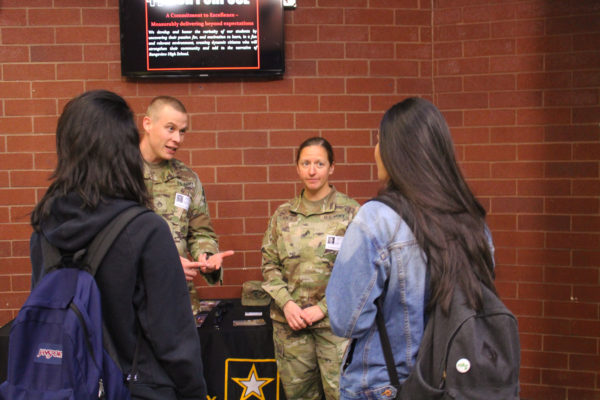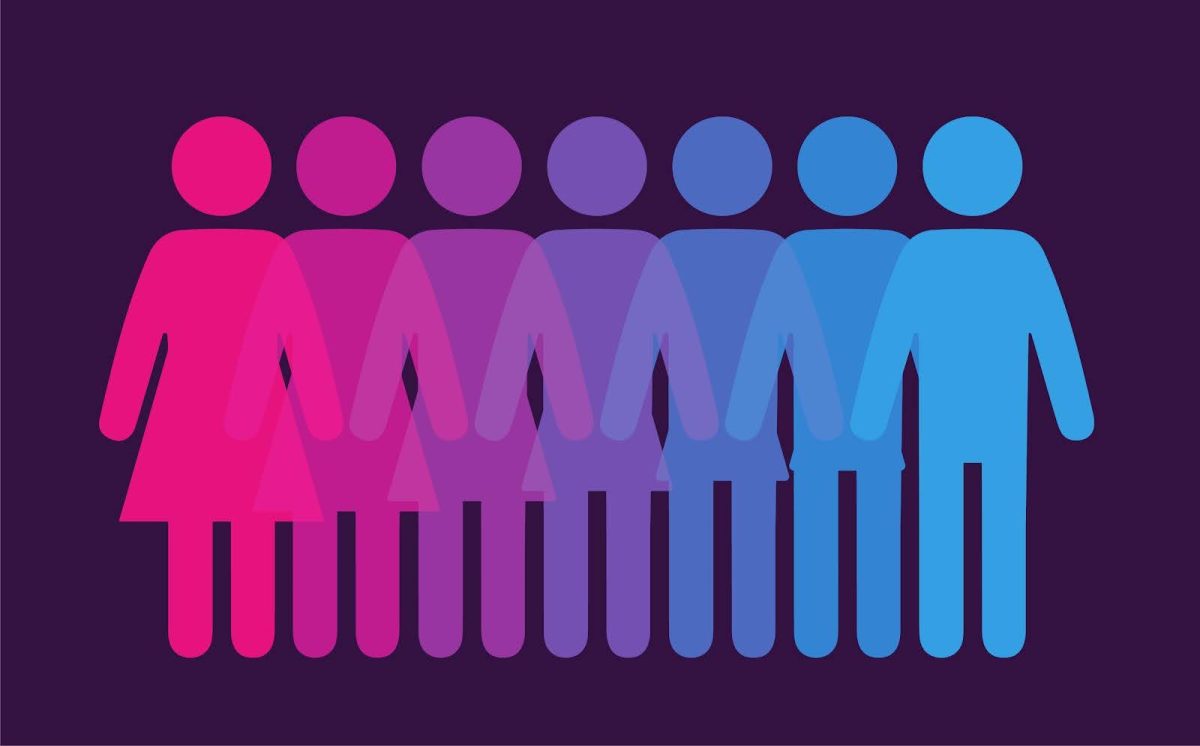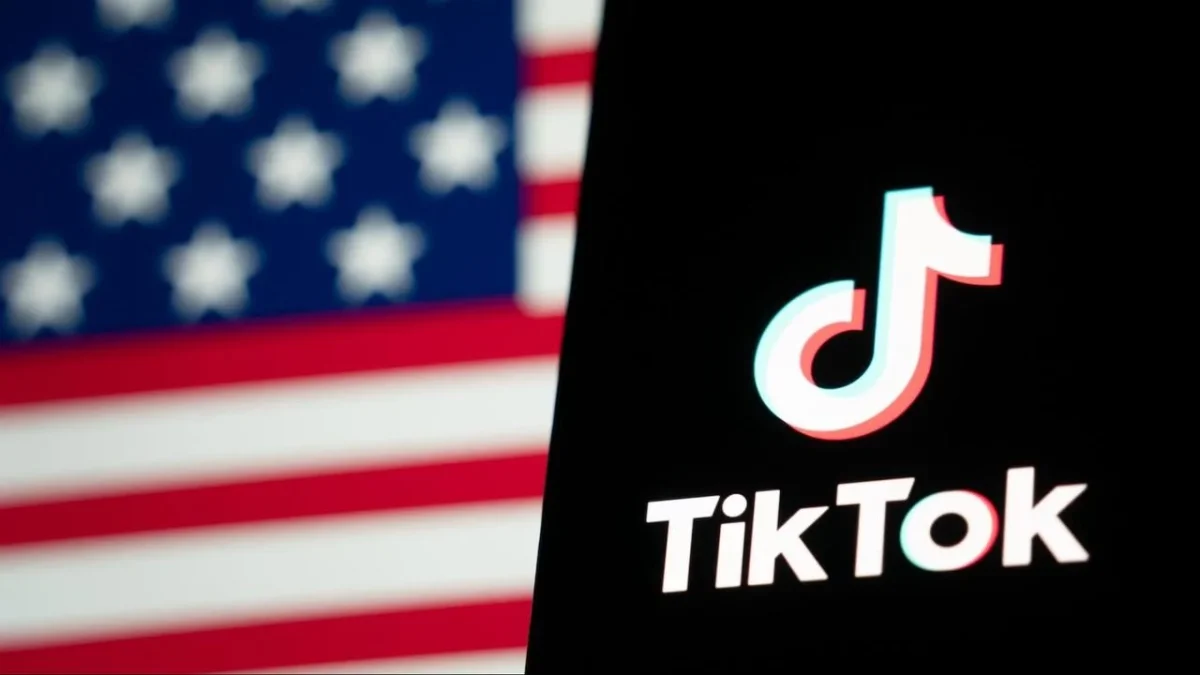Feature Photo By: Mya Johnson – Seniors Arianna Rivas and Ashley Ortega talk to Sergeant Rdes and Sergeant Bray at a table during lunch. The Army, Navy, and Air Force rotate coming to school to talk to students about service. Unfortunately, transgender students may no longer be able to consider service as a career path.
As post-secondary plans are being made, seniors across the country have begun to make the choice of college, the workforce, or U.S. service. College applications, financial stress, military eligibility, and job searches swarm the next generation entering the workforce.
But, according to edweek.org, the military is no longer an option for over 150,000 teenagers in the US. While students are pushed to attend college right after high school, many decide that some kind of armed forces is the best fit for them. President Donald Trump is trying to take that away from transgender teens.
The country was moving forward. In 2011, former president Barack Obama put the policy of “Don’t Ask, Don’t Tell” to an end, allowing gay men and women to serve in the military without hiding their sexuality. In May 2016, RAND Corporation, a company that offers research for the U.S. military, conducted a study that came to the conclusion “that allowing transgender people to serve openly would cost little and have no significant impact on unit readiness,” according to New York Times. A month later, transgender Americans were granted the right to serve in the military and undergo a gender transition while in service.
But, as the presidential race was close to its end, many were afraid for their rights as racial minorities, women, and members of the LGBTQ+ community.
It would take a whole separate piece to get into Trump’s sexual assault allegations, or the wall he wants to build, or the removal of the DACA, or any other thing he has done in targeting people different than him.
Many people who are part of the LGBTQ+ community had just celebrated the legalization of marriage equality in a country that seemed to be progressing–until Donald Trump was elected.
One of the first things he did in office that affected those who identify as LGBTQ+ was the ban on transgender Americans serving in the military.
He announced on Twitter with a thread that read:

“After consultation with my Generals and military experts, please be advised that the United States Government will not accept or allow Transgender individuals to serve in any capacity in the U.S. military. Our military must be focused on decisive and overwhelming victory and cannot be burdened with the tremendous medical costs and disruption that transgender in the military would entail. Thank you [sic]”.
Even if I did agree with what he was doing – with what he believed – Twitter is not the place to make such an announcement. This is the first problem. Secondly, as stated before, transgender soldiers do not cost nearly as much money as Trump insists they do. This just is not right.
My reaction when this hit the news was similar to many others around the country. I was disappointed, to say the least.
Vannah Stockhale, a former Rangeview student who transitioned during her time attending RHS, stated, “My initial reaction was disgust.” She then elaborated, saying, “Only after I found out his reasoning for the ban was an attempt to save money, because of our medication costs that he wouldn’t be paying for, did I become furious because of such a blatantly wrong and incorrect assumption about trans people.”
Stockhale is not the only one who feels this way.
Rangeview’s principal, Ron Fay, stated, “It’s disappointing that we’ve seemed to taken some steps backwards on this issue.”
And while this may not be affecting many Rangeview students directly, it is affecting our generation as a whole.
As Fay said, “There is an emotional impact,” not only on transgender people, but on the people who surround them.
According to ABC News, as many as 6,630 active soldiers are transgender. These numbers were likely to increase because of the acceptance society has built.
As more people feel comfortable coming forward to transition or say that they are gay, a larger number of people feel more comfortable serving in the military with their identity out for others to know.
Unfortunately, though, these numbers will likely decrease. As of right now, Trump’s ban on transgender military service has lost in court for the second time. Originally, the ban was to be set in place in May of 2018, but that is unlikely at this point in the legal battle. It is still unclear how long it will take for Trump to get his way – or if he will get his way.
But what happens to the thousands of transgender teens who planned on serving to pay for college or simply because that is what they what to do with their lives?
“Those students who planned to join the military and are simultaneously transitioning, now have to make new choices for their life they wouldn’t have made on their own,” says Stockhale.
Many military officials are upset with the decision as well.
“If you wanna serve your country, I don’t believe that anyone should not be afforded that option,” stated Dustin Logan, an eight year veteran, to the State Press.
It’s not easy to have to change plans for the future once you have set your mind to something. That is what these teenagers have to do and it is not fair.
This is a heartbreaking issue, no doubt. The best thing to do right now is to hope that the courts will continue to repeal this and that our friends and classmates can freely choose whatever career path they want to in the future.






